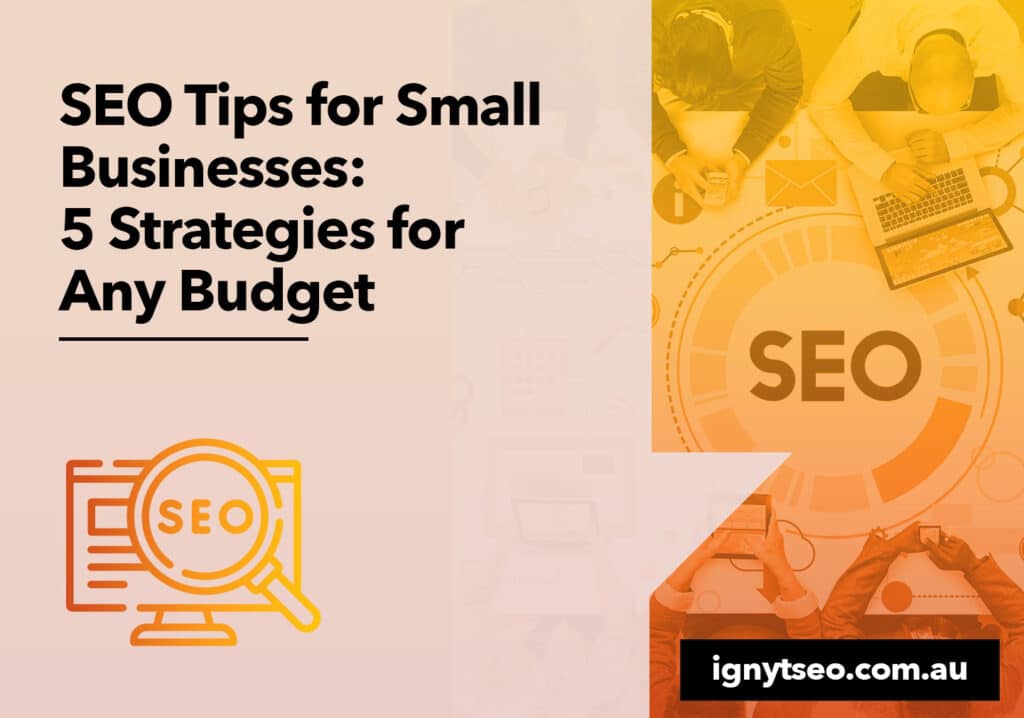Have you just started a business? Congratulations- that’s no small feat! Are you now trying to figure out how to make your business’s website more visible?
Do you have a basic understanding of what SEO (Search Engine Optimisation) means, but you’re unsure how to apply it to your website? Don’t worry; we have you covered!
You don’t have to be an SEO expert to make simple changes to attract more website traffic and customers.
There are straightforward steps you can implement right now, even with limited resources and a modest budget.
Whether you’re a one-person show or a small team, this guide will equip you with five small business SEO strategies to help you stand out in the vast landscape of websites and online businesses.
We’ll discuss these five strategies:
- Creating a blog
- Fixing errors on your site
- Building linking opportunities
- Leveraging social media
- Growing locally
Create a Blog
While blogging has been around since the mid-1990s, it was in the early 2000s that website blogs became a big deal.
Their popularity was due to the release of platforms like Blogger and WordPress, which made it easy for anyone to create and publish blog content without technical skills.
Blogging has become essential to any online business’s SEO strategy because search engines love fresh content, and blogs are one of the easiest ways to produce this continuously.
Search engine spiders (internet bots that crawl websites and store information for search engines) constantly scour the web for new content to index and rank in search results.
Regularly producing quality blog posts on your website gives them plenty of fresh material to work with.
But it’s not just about quantity- the quality of your blog posts is what really counts.
How can you create quality blogs related to your business?
Follow these tips:
- Define your target audience. Knowing your audience is the only way to create blog content that resonates with them. For example, if your online business sells women’s clothing, your blog posts should focus on topics related to women’s fashion. It’s best to stick to only one main topic to create consistent and credible content.
- Conduct research. If you want your audience to trust you, your blog content must be accurate and up-to-date. Research the topics you want to write about and look for current trends in the industry to provide your readers with valuable information they can use immediately.
- Write for your audience. Once you know your target audience and have done your research, it’s time to write! Write your blog posts in an engaging, conversational tone that’s easy to read. Aim for 1000-1500 words per post, not too long or short. When writing, keep in mind your target audience, their age, and interests. Write to them directly using the second-person point of view.
- Use keywords. Keywords are like “secret codes” that search engine spiders use to find and rank your blog posts. But how do you know what keywords to use in your blog? Look online for free keyword explorers, such as WordStream. To use this tool, you only need to input one or two words that summarise your blog, filter the industry and country, and bam! WordStream will present you with all the related keywords you can use in your blog. Include these keywords in your text’s title, headings, and body to optimise your content so it’s easily found in search results.
Using this SEO tip for small businesses regarding blog content, you’ll be able to create quality blog content that can draw more customers to your website.
So what are you waiting for? Get blogging!
Check and Address Your Site Errors
If you’re one of those “go-getter” types that built your own website- hats off to you! It’s not an easy undertaking.
But one thing you need to do is check and address any errors on your website. Why?
Search engine spiders don’t like broken links or other technical problems that affect user experience.
You must regularly check for errors and address them as soon as possible to maintain a healthy website that search engines will love.
Common site errors include
- Broken or missing links
- Missing images and alt texts
- Too much code on the page
- Pages that take too long to load
Use a free tool like Google Search Console to identify any website issues that need fixing.
It’s also a good idea to periodically review your website’s content to ensure it’s up-to-date.
Outdated information and missing images will negatively impact your rankings in search engine results.
While you’re looking for any issues, test out the speed of your website.
If it takes too long to load, your customers will likely go elsewhere.
One study by Portent showed that e-commerce sites with loading speed times of 0-2 seconds have the highest conversion rates.
With each second of load time after 2 seconds, conversion rates drop by an average of 4.42%.
To test your website’s speed, use a tool like Pingdom.
If the speed is on the slower side, try eliminating any unnecessary elements, like large images or videos.
A website that’s error-free and loads quickly will create an enjoyable user experience for visitors.
Following this SEO tip for small businesses will help boost your search engine rankings in the long run.
Build Links Using Natural Relationships
Link building is one of the most important SEO tips for small businesses. Unfortunately, link building is often misunderstood.
Many people think they can simply buy links to their website, but this isn’t a good idea.
Search engines are improving at identifying link schemes and penalising sites that use them.
So what should you do to build website links genuinely? Focus on creating relationships with other companies or influencers in your industry.
Then ask them to link to your website in exchange for a link from your page.
This natural link building will help you build credibility with search engines, which is crucial for getting your website to rank higher in the SERPs (Search Engine Results Page).
Developing relationships with industry leaders or influencers may seem intimidating initially, but think of it as networking.
It’s all about connecting with people with similar interests.
Start by finding the key influencers in your industry, following them on social media, and engaging with their content.
Another way to build relationships with people who may be interested in linking to your content is by reaching out to those you constantly have business dealings with.
Going back to the example of an online women’s clothing store, let’s say you use a supplier to provide you with packaging for orders.
Chances are they also have a website and are trying to attract more customers.
A simple email asking if they’d be interested in a reciprocal link exchange could increase traffic on both your websites and improve your rankings in the SERPs.
It’s a win-win situation, so don’t hesitate to reach out!
Be More Active on Social Media
We live in the age of social media, so it’s wise to utilise these platforms to take advantage of the massive opportunity to reach potential customers!
Creating and managing effective social media accounts is essential for any small business today to drive more attention and website clicks.
Start by developing content calendars for each social media platform, thinking about what content you want to share, and planning when you’ll share it.
Next, optimise the content and images you post. For example, each post should contain relevant keywords to aid your posts in appearing higher in search engine results.
Additionally, your images need to be sized correctly for the platform they appear on, as a properly sized image will look better and attract more viewers.
Linking your website to all of your social media accounts makes it easier for viewers to access your website from your posts.
And don’t forget to really sell your brand, letting people know what makes you unique and why they should be interested in your product.
If you want to take your social media presence to the next level and make managing your accounts easier, use tools like Hootsuite or Agorapulse.
These platforms allow you to easily schedule posts in advance, track the performance of each post and see who is engaging with your content.
Such insights will help you develop future content so your social media presence is as effective as possible.
You can also use that information to shape future blog content.
The more you know about who is engaging with your content, the more you can do to reach them.
Grow Locally
If you’re a small business owner in a small town, you have an advantage that many larger companies don’t- you can focus on a specific geographical area.
Google has been emphasising local SEO for some time now.
Take advantage of this by creating a Google Business Profile and listing your business in directories like Yelp and Yellow Pages.
The beauty of using Google Business Profile is that it allows you to share information about your business, like contact information, opening hours, and services or products you offer.
Also, add photos of your business to show up in local search engine results.
Getting more eyeballs on your business will assist in driving up traffic to your website.
You should also think about creating content that focuses on your local area.
This could be anything from a blog post about local events, attractions, or the history of your town.
This kind of content will attract readers looking for information about the area.
Lastly, take advantage of any networking opportunities in your area.
Go to local events and meet-ups and join local business groups to be visible in your community.
Such visibility will help create a buzz around your brand, positively affecting SEO and attracting potential customers.
Do You Need More Help With SEO?
We hope you’ve found these SEO tips for small businesses helpful.
But do you need more help with SEO?
Trying to do everything yourself is admirable, but it isn’t always possible!
Here at Ignyt SEO, we know how much time and effort it takes to run a successful small business.
We don’t want your online presence to suffer because you don’t have enough time to manage your business’s SEO.
So that’s where we come in! Our team of qualified SEO experts will provide detailed reports about the performance of your current website and make suggestions for improvement, from technical optimisation to keyword research and link building.
We also focus on creating engaging and SEO-friendly content so your website is more visible in search engine results.
After implementing the latest and best search engine practices, we’ll track the performance of your website over time.
That way, you can keep an eye on how it’s doing and see the results for yourself.
If you’re ready to take your small business to the next level, contact Ignyt SEO today!
Call us on 02 9055 7611 or complete our online enquiry form.








